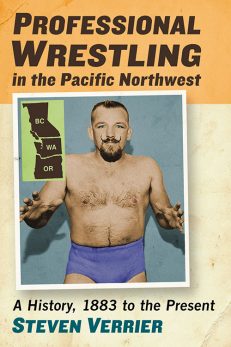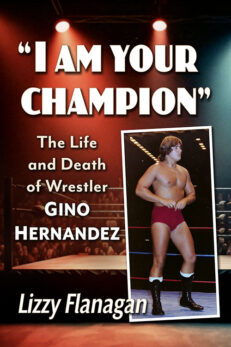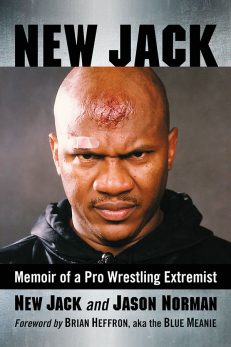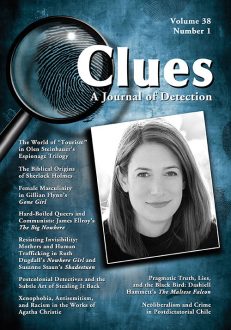Clues: A Journal of Detection, Vol. 38, No. 1 (Spring 2020)
Print Back Issue$30.00
In stock
About the Book
BACK ISSUE
This is a single back issue only. To order a current subscription, or for more information, please visit the journal’s web page at CluesJournal.com. Back issues from earlier volumes of Clues are available for order subject to availability. Also, single issues of the current volume may be ordered one at a time. Individuals may order back issues directly from our online catalog, and the charge for individuals is $30 (excluding postage). Issues from Volume 33 to the present are also available in ebook format on Kindle, Nook and Google Play. The charge for single issues for institutions is $75 per issue (excluding postage). If your institution requires a back issue, please contact us to order at the appropriate rate.
About the Author(s)
Bibliographic Details
Executive Editor Janice M. Allan
Managing Editor Elizabeth Foxwell
Consulting Editor Margaret Kinsman
Format: softcover (7 x 10)
Pages: 120
Bibliographic Info:
Copyright Date: 2020
ISSN 0742-4248
Imprint: McFarland
Table of Contents
Introduction (Janice M. Allan) 5
The Clues executive editor outlines the content of Clues 38.1, with articles on authors such as Isaac Asimov, Cheng Xiaoqing, Agatha Christie, Arthur Conan Doyle, Ruth Dugdall, James Ellroy, Gillian Flynn, Dashiell Hammett, Tatiana Lobo, Satyajit Ray, Susanne Staun, and Olen Steinhauer.
“Floating Unmoored”: The World of “Tourism” in Olen Steinhauer’s Espionage Trilogy (Robert Lance Snyder) 9
Olen Steinhauer’s espionage trilogy dramatizes its protagonist’s struggle to forge a centered identity after years of service as a black-ops agent in the CIA’s fictive Department of Tourism. By committing himself to his wife and stepdaughter, Milo Weaver escapes a downward spiral into suicidal disintegration captured by the trope of “floating unmoored.” The series’ recursivity involves structural elements that can be identified as momentum and world-building.
Altering the Hypermasculine through the Feminine: Female Masculinity in Gillian Flynn’s Gone Girl (Beth Stratton) 19
Gillian Flynn’s Gone Girl offers a modern take on the neo-homosocial triangle that results in the triumph of a female masculinity. With the aid of his queer-coded sister, the character of Nick learns to temper his hypermasculinity with a more feminized version of masculinity to win back his wife, Amy.
Hard-Boiled Queers and Communists: James Ellroy’s The Big Nowhere (Joshua Comyn) 28
This article argues that the characterization of the killer in James Ellroy’s The Big Nowhere (1988), together with Ellroy’s development as a novelist, can be illuminated through the representation of psychoanalysis and Marxism within the novel, as well as by the historical context of the novel’s fictional setting.
Resisting Invisibility: Mothers and Human Trafficking in Ruth Dugdall’s Nowhere Girl and Susanne Staun’s Skadestuen (Charlotte Beyer) 37
Human trafficking is regularly presented in twenty-first-century crime fiction, frequently through stereotypes of femininity but rarely involving mothers or maternal experience. This article seeks to remedy this gap in representation by analyzing two twenty-first-century crime novels featuring trafficking plots that focus specifically on the politics of representing mothers.
Memory for Sale: Neoliberalism and Crime in Postdictatorial Chile in El corazón del silencio by Tatiana Lobo (Julia González Calderón) 48
This article examines the image of postdictatorial Chile as depicted in the neopolicial novel El corazón del silencio (Heart of Silence, 2012) by Tatiana Lobo. The plot explores how neoliberal progress at the beginning of the new millennium has transformed a painful national past into a sort of tabula rasa in which the historic memory and voices of victims are erased in exchange for economic growth and material wealth.
Postcolonial Detectives and the Subtle Art of Stealing It Back (Michael Harris-Peyton) 60
Using the mysteries of Satyajit Ray and Cheng Xiaoqing as cases, this article posits that “transgressive” formal changes to the crime fiction genre in a postcolonial context, like anticolonial “counter-thefts” committed by heroic detective figures, belie the genre’s capacity for articulating non–Eurocentric juridical norms. Instances of this capacity continue to be marked as exceptional, ignoring the genre’s historical development via intercultural contact.
“Scoring Off a Foreigner?” Xenophobia, Antisemitism, and Racism in the Works of Agatha Christie (Shane Brown) 70
Some members of the press and fans believed the BBC adaptation of Agatha Christie’s The A.B.C. Murders (2018) portrayed Poirot as “a victim of anti-migrant prejudice, living amongst xenophobic neighbours” (Clark). This article examines how Christie’s work reflected, fought against, and yet was sometimes complicit with the xenophobia, antisemitism, and racism within the British society of Christie’s time.
A Study in Daniel: Tracing the Biblical Origins of Sherlock Holmes (Rebecca Josephy) 81
In the nineteenth century, a biblical episode in the Book of Daniel, known colloquially as Belshazzar’s Feast or “The Writing on the Wall” scene, became extremely popular. The author argues that A Study in Scarlet not only borrows its main mystery from this biblical story but also its deeper views of punishment and justice.
Pragmatic Truth, Lies, and the Black Bird: Dashiell Hammett’s The Maltese Falcon (Marc LaViolette) 92
This article proposes that the main theme of Dashiell Hammett’s novel The Maltese Falcon is the search for pragmatic truth. By highlighting differences between this novel and typical hard-boiled crime stories, a new interpretation of the Flitcraft parable reveals that Charles Peirce’s pragmatism replaces magic or religion in this inverted romance.
“A Necessary Clue”: The Mysteries of Isaac Asimov (Elizabeth Foxwell) 103
Although Isaac Asimov’s writings include a substantial number of mysteries, criticism has centered on his sci-fi mystery series featuring detective Elijah Baley and robot R. Daneel Olivaw, with his mainstream mysteries dismissed as negligible. This article discusses works such as Asimov’s neglected The Death Dealers (aka A Whiff of Death, 1958) and serious themes in his mysteries.
REVIEWS
John Cullen Gruesser. Edgar Allan Poe and His Nineteenth-Century American Counterparts. (Paul Thifault) 111
J. K. Van Dover. The Detective and the Artist: Painters, Poets and Writers in Crime Fiction, 1840s–1970s. (Elizabeth Blakesley) 112
Cheryl Blake Price. Chemical Crimes: Science and Poison in Victorian Crime Fiction. (Marla Harris) 114
Mary Stoecklein. Native American Mystery Writing: Indigenous Investigations. (Lynnette Porter) 115
Mary Evans, Sarah Moore, and Hazel Johnstone. Detecting the Social: Order and Disorder in Post–1970s Detective Fiction. (Christine Photinos) 117
Author Guidelines are on page 120.
Book Reviews & Awards
- “Clues is a must-have for readers and writers of crime fiction. Scholarly, thought-provoking, wide-ranging in its topics, Clues covers the crime and thriller map.”—Sara Paretsky
- “A. Conan Doyle, notoriously resentful of Sherlock Holmes’s success, liked to scorn ‘police romances’ as less significant and worthy of his talents than his other literary work. If he could have read Clues, the thinking mystery reader’s journal, he would surely have felt differently—and learned much he never realized himself about even his own landmark contribution to the genre, from which so much else by others has flowed.”—Jon Lellenberg, U.S. agent for the Arthur Conan Doyle estate
- “I love reading Clues. Every issue provides thought-provoking, well-researched articles. The variety and scope of the material found in Clues makes an unparalleled, ongoing contribution to our understanding of the role of crime fiction in our culture, and the genre’s reflection of its time and society.”—Jan Burke, Edgar-winning author of The Messenger (2009)
- “Clues is an important journal. It carries the torch of tradition that is the backbone of detective fiction. It goes below the surface and gets to the heart of what makes the genre so fascinating and valid today”—Michael Connelly, author of the Harry Bosch novels, including The Overlook (2007)
- “For erudite and fascinating truths about mysteries, follow the clues to Clues, the scholarly journal that is an essential resource for every serious student of the mystery”—Carolyn Hart, author of Death Walked In (2008)
- “With scholarship ranging from Poe to Peters, nothing beats Clues”—Joan Hess, author of Mummy Dearest (2008)





